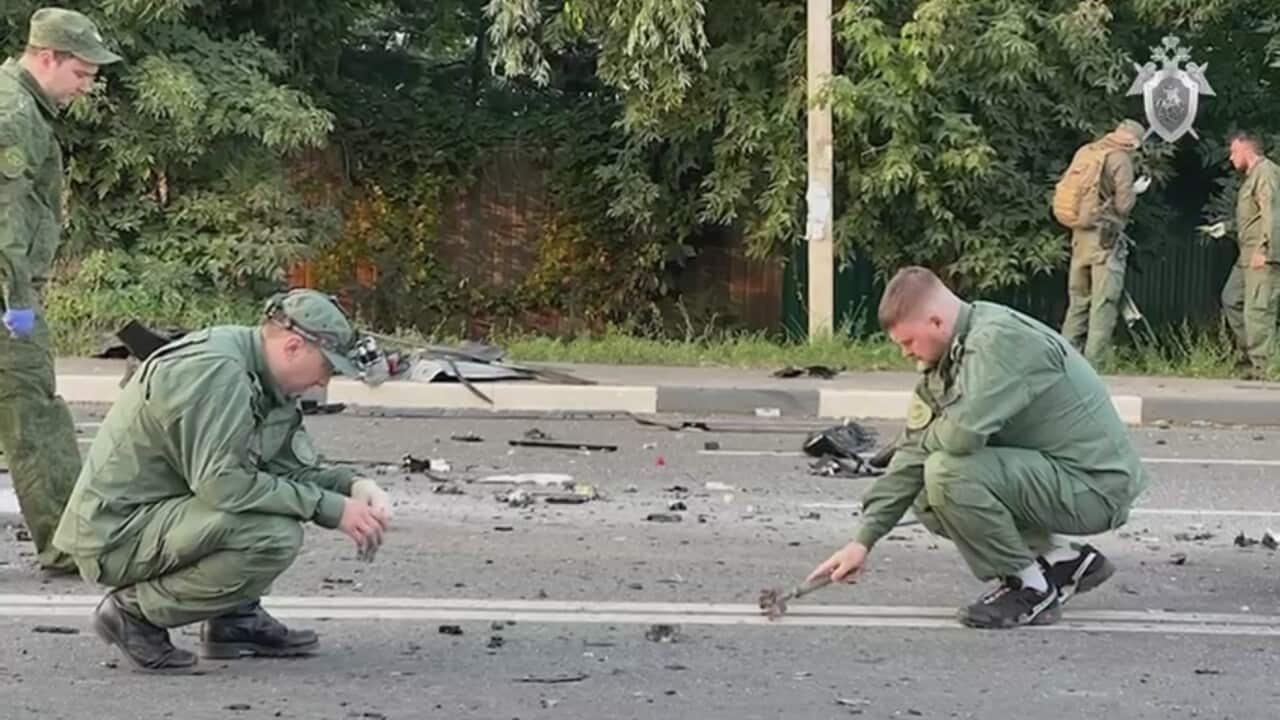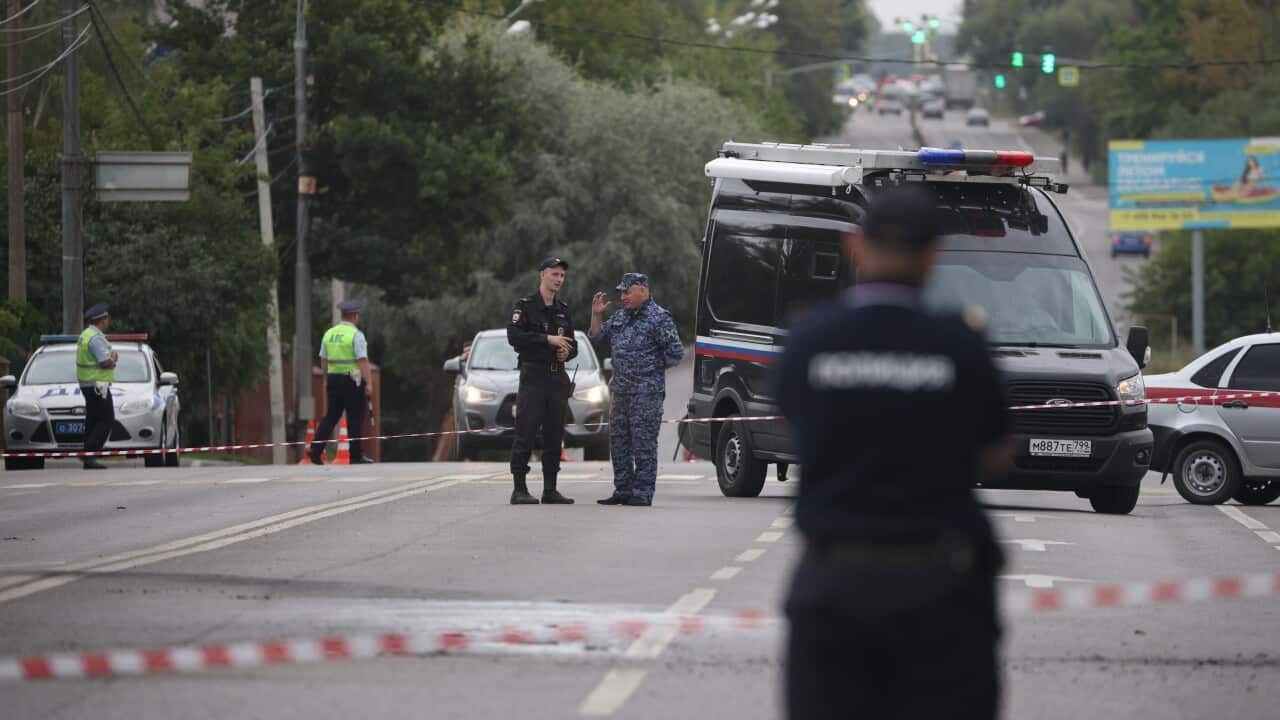Key Points
- Law enforcement agencies have placed the Ukrainian woman on the country's wanted list.
- Ms Dugina, whose father Alexander Dugin is a prominent ideologue, was killed on Saturday evening.
Russia's Federal Security Service has accused Ukraine's secret services of killing Daria Dugina, the daughter of a Russian ultra-nationalist, in a car bomb attack near Moscow that President Vladimir Putin called "evil".
Ms Dugina, whose father Alexander Dugin is a prominent ideologue, was killed on Saturday evening when a bomb blew up the Toyota Land Cruiser she was driving, Russian investigators said.
Ukraine, which is defending itself from what it says is an imperial-style war of conquest waged by Russia, has denied involvement in the attack, with Ukrainian presidential adviser Mykhailo Podolyak calling the accusation "propaganda".
Who was Daria Dugina?
Ms Dugina, a media commentator who appeared regularly on state TV, was a strong supporter of Russia's actions in Ukraine, which Russia's government calls a "special military operation".
Her father, Alexander Dugin, 60, has long advocated for the unification of Russian-speaking and other territories in a new Russian empire.
In his first public statement on the car bombing, he said Ms Dugina had been savagely killed before his own eyes by Ukraine.
"Our hearts are not simply thirsting for revenge or retribution," Mr Dugin wrote.
"We only need our victory (against Ukraine). My daughter has sacrificed her young life on the altar of victory. So please win!"
Russia accuses Ukraine
Russia's FSB security service said the attack was carried out by a Ukrainian woman born in 1979, whom it named and whose picture and personal information appeared on Russian news websites.
The websites linked her to Ukraine's security services and accused her of being a member of the Azov battalion, a militia set up by Ukrainian ultra-nationalists in 2014 and later incorporated as a regiment in Ukraine's national guard.
In response, Azov said in a statement on the Telegram messaging app that the woman named by the FSB had never been a member of the unit and accused Russia of concocting a lie.

Russian police officers guard the scene of a car bombing in Bolshiye Vyazyomy, in which journalist Daria Dugina was killed. Source: AAP / TASS/Sipa USA
She had driven a Mini Cooper around Moscow which she used to spy on Ms Dugina and for which she had three different sets of licence plates to avoid detection, it said.
She had attended an event outside Moscow on Saturday evening which Ms Dugina and her father were also at, it added, before carrying out a "controlled explosion" of Dugina's car.
She had then fled Russia to Estonia in the same Mini Cooper.
Estonia responds
Russian law enforcement agencies had placed the Ukrainian woman on the country's wanted list, the TASS news agency reported, with authorities seeking her extradition from Estonia.
Estonia's interior ministry and police and border guard service said in separate statements they could share information on individuals entering and leaving Estonia "only in cases prescribed by law," adding that the FSB allegation did not meet that requirement.
The police and border guard service said it had received no Russian request for information on the matter.

Candles and flowers are placed at the Message sculpture in Bryusov Lane, Moscow as a tribute to the late journalist Daria Dugina. Source: AAP, SIPA USA / TASS
"Estonia, of course will not hand them over," Ms Simonyan wrote on Telegram.
"I think we can find professionals who want to admire the spires in the vicinity of Tallinn," she added, an apparent reference to a 2018 attack in England on former Russian spy Sergei Skripal which the United Kindgom said Russia was behind.
Russia denied the UK's accusation.
A memorial service for Ms Dugina will be held on Tuesday at Moscow's TV centre, her father said.

A memorial service for Ms Dugina will be held on Tuesday at Moscow's TV centre, Ms Dugina's father said. Source: AAP / TASS/Sipa USA
Scepticism from Russian opposition figures
Some Russian opposition figures were sceptical about the speed at which the FSB appeared to have solved the case and have suggested alternative versions of what might have happened.
Ilya Ponomarev, a former Russian MP turned Ukraine-based Kremlin critic, said on Sunday evening that a previously unknown group of Russian militants called the National Republican Army was responsible for Ms Dugina's killing.
Mr Ponomarev's assertion and the existence of the group could not be independently verified by Reuters.
He was the only member of the Russian State Duma, the lower house of parliament, to vote against the annexation of Ukraine's Crimea region in 2014 and he later left the country.
Mr Ponomarev, who runs an online TV station from Kyiv designed to challenge the Kremlin's narrative of the war, read out on air on Sunday a manifesto that he said the group had sent him.
It said the group was committed to overthrowing Mr Putin and building a new Russia.










